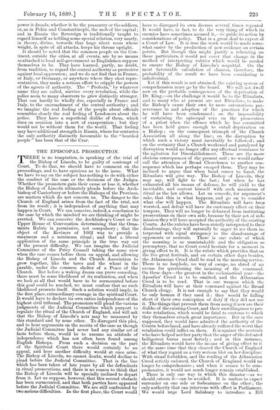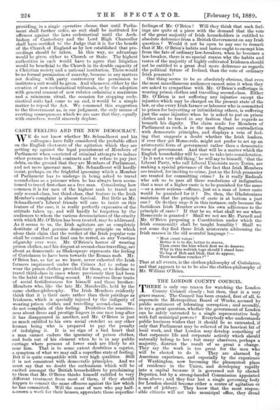THE EPISCOPAL PROSECUTION. T HERE is no temptation, in speaking of
the trial of the Bishop of Lincoln, to be guilty of contempt of Court. To do that, we should. have to comment on the proceedings, and to have opinions as to the issue. What we have to say on the subject has nothing to do with either the conduct of the case or the decisions of the Judges. Whether the promoters gain their cause or lose it, whether the Bishop of Lincoln ultimately pleads before the Arch- bishop of Canterbury or before the Bishops of the Province, are matters which do not concern us. The danger to the Church of England arises from the fact of the trial, not from its result ; it is independent of anything that may happen in Court. We can conceive, indeed, a conclusion to the case by which the mischief we are thinking of might be averted. We can conceive the Archbishop's Court or the Upper House of Convocation determining that the Orna- ments Rubric is permissive, not compulsory ; that the object of the Revisers of 1662 was to provide a maximum and a minimum ritual ; and that a liberal application of the same principle is the true way out of the present difficulty. We can imagine the Judicial Committee of the Privy Council taking the same view when the case comes before them on appeal, and allowing the Bishop of Lincoln and the Church Association to grow together, like the tares and the wheat in the parable, under the common shelter of a Peace of the Church. But before a waking dream can prove consoling, there must be some likelihood of its realisation, and when we look at all that would. have to be surmounted before this goal could be reached, we must confess that no such likelihood presents itself. Such a solution would imply, in the first place, extraordinary courage in the spiritual Court. It would have to declare its own entire independence of the highest civil tribunal. The promoters will plead the various judgments of the Judicial Committee which purport to regulate the ritual of the Church of England, and will ask that the Bishop of Lincoln's acts may be measured by this standard and by none other. To disregard this plea, and to hear arguments on the merits of the case as though the Judicial Committee had never had any similar set of facts before them, would be to assume an attitude of independence which has not often been found among English Bishops. From such a decision on the part of the Spiritual Court there would certainly be an appeal, and here another difficulty would at once arise. The Bishop of Lincoln, we cannot doubt, would decline to plead before the Judicial Committee. That is the line which has been taken of late years by all the defendants in ritual prosecutions, and there is no reason to think that the Bishop of Lincoln will be specially inclined to depart from it. Let us suppose, however, that this second obstacle has been surmounted, and that both parties have appeared before the Judicial Committee. We are still confronted by two serious difficulties. In the first place, the Court would have to disregard its own decrees several times repeated It would have, in fact, to do the very thing of which its enemies have sometimes accused it, to guide its action by considerations of policy. That is a great deal to expect of a Court of Law. It is true the work would be made some- what easier by the production of new evidence on certain points. But though this might justify a rehearing on these particulars, it would not cover that change in the method of interpreting rubrics which would be needed to ensure the Bishop of Lincoln's acquittal. On the most favourable calculation of chances, therefore, the probability of the result we have been considering is infinitesimaL Yet if this result is not obtained, the existing system of comprehension must go by the board. We will not dwell now on the probable consequences of the deprivation of Dr. King.—on the challenge it would be to the Ritualists,' and to many who at present are not Ritualists, to make the Bishop's cause their own by more ostentatious per- severance in and adoption of the practices for which he will have been condemned ; on the impossibility of sustaining the episcopal veto on the prosecution of a priest when the offence which he has committed has been held grave enough to entail deprivation on a Bishop ; on the consequent triumph of the Church Association all along the line ; on the disruption by which such a victory must inevitably be followed ; and on the certainty that a Church weakened and paralysed by disruption would no longer offer any effectual resistance to the agitation for Disestablishment. These are the more obvious consequences of the present suit ; we would rather call the attention of Broad Churchmen to another con- sequence which has perhaps escaped them. They may be inclined to argue that when hand comes to hand, the Ritualists will give way. The Bishop of Lincoln, they may say, will fight to the last ; but when he has exhausted all his means of defence, he will yield to the inevitable, and content himself with such maximum of ritual as the law allows. Let us concede, for argument's sake, that this is what happens, and go on to consider what else will happen. The Ritualists will have been worsted, and defeat will have its customary effect on their tempers. They will no longer be debarred from instituting prosecutions on their own side, because by their act of sub- mission they will have accepted the authority of the existing Courts. As the rubrics have been strictly interpreted to their disadvantage, they will naturally be eager to see them in- terpreted with equal stringency to the disadvantage of opponents or neutrals. There is one rubric of which the meaning is so unmistakable and the obligation so peremptory, that no Court could hesitate for a moment in giving effect to it. It is the rubric which provides that on the five great festivals, and on certain other days besides, the Athanasian Creed shall be read in the morning service. There is no loophole, no way of escape, no shred of an excuse for questioning the meaning of the command. On these days—the greatest in the ecclesiastical year—the Apostles' Creed is to be omitted, and the Athanasian Creed is to be read. That is one weapon which the Ritualists will have at their command against the Broad Church clergy. It is not enough to say that they would be only human if they used it : they would be falling short of their own conception of duty if they did not use it. The things that prevent them from using it now are their dislike of the existing Court, and their unwillingness to pro- voke retaliation, which would be fatal to customs to which they themselves attach great importance. But in the case supposed, they would have admitted the authority of the Courts beforehand, and have already suffered the worst that retaliation could inflict on them. It is against the neutrals who have helped neither party that the anger of the defeated belligerent burns most fiercely ; and in this instance, the Ritualists would have the means of giving effect to it at the same time that they cleared the Church of England of what they regard as a very serious blot on her discipline. With ritual forbidden, and the reading of the Athanasian Creed strictly enforced, the Church of Eengland would no longer be comprehensive ; and when it ceases to be com- prehensive, it would not much longer remain established. There is only one way in which this disaster—as we should esteem it—can be avoided. It is useless to expect surrender on one side or forbearance on the other ; the only authority that can intervene with effect is Parliament. We would urge Lord Salisbury to introduce a Bill providing, in a single operative clause, that until Parlia- ment shall further order, no suit shall be instituted for offences against the laws ecclesiastical until the Arch- bishop of Canterbury and the Lord High Chancellor shall have certified to the Judge that it is for the benefit of the Church of England as by law established that pro- ceedings should be taken. In this way, no advantage would be given either to Church or State. The highest authorities in each would have to agree that litigation would be beneficial to the Church in its double capacity of a Christian society and a national institution. There would be no formal permission of anarchy, because in any matters not dealing with party controversy the permission to institute a suit would be given. And whenever, either by the creation of new ecclesiastical tribunals, or by the adoption with general consent of new rubrics ordaining a maximum and a minimum ritual, the occasion for stopping eccle- siastical suits had come to an end, it would be a simple matter to repeal the Act. We commend this suggestion to the Government as, in our judgment, the only means of averting consequences which we are sure that they, equally with ourselves, would sincerely deplore.







































 Previous page
Previous page